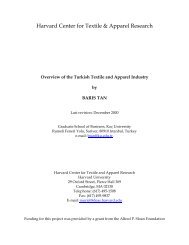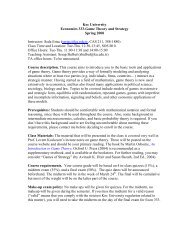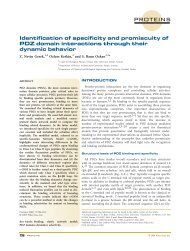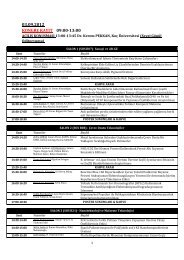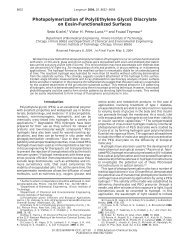Comment on Hekman's "Truth and Method: Feminist Standpoint ...
Comment on Hekman's "Truth and Method: Feminist Standpoint ...
Comment on Hekman's "Truth and Method: Feminist Standpoint ...
Create successful ePaper yourself
Turn your PDF publications into a flip-book with our unique Google optimized e-Paper software.
COMMENT<br />
Collins<br />
occupy fundamentally different locati<strong>on</strong>s in hierarchical power relati<strong>on</strong>s.<br />
These women did not just enter this space in a r<strong>and</strong>om fashi<strong>on</strong>. An entire<br />
arsenal of social instituti<strong>on</strong>s collectively created paths in which the individuals<br />
assigned to <strong>on</strong>e group received better housing, health care, educati<strong>on</strong>,<br />
<strong>and</strong> recreati<strong>on</strong>al facilities, while those relegated to the other group<br />
did with worse or did without. The accumulati<strong>on</strong> of these different experiences<br />
led the two groups of women to that same academic space. The<br />
actual individuals matter less than the accumulati<strong>on</strong> of social structures<br />
that lead to these outcomes. In this sense, developing a political theory<br />
for women involves c<strong>on</strong>fr<strong>on</strong>ting a different <strong>and</strong> more complex set of issues<br />
than that facing race theories or class-based theories because women's<br />
inequality is structuredifferently.<br />
There is a third theme of st<strong>and</strong>point theory in which power is erased,<br />
namely, the significance of group c<strong>on</strong>sciousness, group self-definiti<strong>on</strong>, <strong>and</strong><br />
"voice" within this entire structure of power <strong>and</strong> experience. Collapsing<br />
individual <strong>and</strong> group identity emerges here as significant because applying<br />
st<strong>and</strong>point theory to the individual as proxy for the group becomes particularly<br />
problematic in comparing individual voice with group voice or<br />
st<strong>and</strong>point. Typically, this process operates via imagining how individuals<br />
negotiate self-definiti<strong>on</strong>s <strong>and</strong> then claiming a "family resemblance" positing<br />
that collectivities undergo a similar process. Because collectivities<br />
certainly do c<strong>on</strong>struct stories in framing their identity, this approach appears<br />
plausible. But can the individual st<strong>and</strong> as proxy for the group <strong>and</strong><br />
the group for the individual? Moreover, can this particular versi<strong>on</strong> of the<br />
individual serve as the exemplar for collective group identity?<br />
If an individual reas<strong>on</strong>s from his or her own pers<strong>on</strong>al experiences by<br />
imagining that since "we are all the same under the skin, therefore, what<br />
I experience must be the same as what everybody else experiences," then<br />
a certain percepti<strong>on</strong> of group narrative structuremerges. If an individual<br />
believes that his or her pers<strong>on</strong>al experiences in coming to voice, especially<br />
the inner voices within his or her own individual c<strong>on</strong>sciousness hidden<br />
from hierarchal power relati<strong>on</strong>s, not <strong>on</strong>ly reflect a comm<strong>on</strong> human experience<br />
but, more to the point, also serve as an exemplar for how group<br />
c<strong>on</strong>sciousness <strong>and</strong> decisi<strong>on</strong> making operate, then individual experience<br />
becomes the model for comprehendingroup processes. This approach<br />
minimizes the significance of c<strong>on</strong>flict within groups in generatin group<br />
narratives. In the model in which an individual c<strong>on</strong>ducts inner dialogues<br />
am<strong>on</strong>g various parts of his or her "self," the process of mediating c<strong>on</strong>flicting<br />
identities occurs within each individual. The individual always<br />
holds complete power or agency over the c<strong>on</strong>sciousness that he or she<br />
c<strong>on</strong>structs in his or her own mind <strong>and</strong> the voice that she or he uses to<br />
express that c<strong>on</strong>sciousness.<br />
Shifting this mode of coming to voice to the level of the small group<br />
Winter 1997 SIGNS 379<br />
This c<strong>on</strong>tent downloaded from 212.175.32.130 <strong>on</strong> Tue, 26 Mar 2013 07:55:02 AM<br />
All use subject to JSTOR Terms <strong>and</strong> C<strong>on</strong>diti<strong>on</strong>s



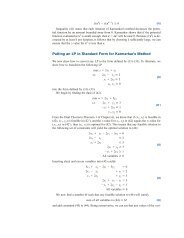
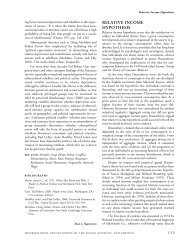

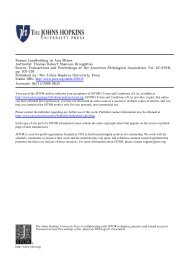
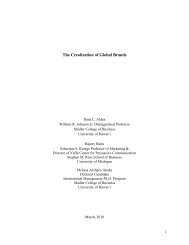

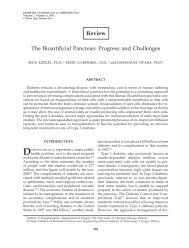
![]_[O](https://img.yumpu.com/10363126/1/190x138/-o.jpg?quality=85)
